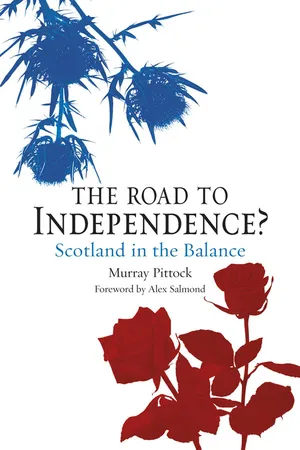![]()
References
Introduction: Why Scotland?
1 Ewen Cameron, Impaled upon a Thistle: Scotland since 1880 (Edinburgh, 2010), p. 1; Iain McLean, Jim Gallagher and Guy Lodge, Scotland’s Choices: The Referendum and What Happens Afterwards (Edinburgh, 2013), p. 77, for English suspicion of unfairness in Scottish spending; Ed Miliband’s ‘One Nation’ speech at the Labour Party Conference in 2012 (see www.bbc.co.uk) was followed up in a number of other contexts.
2 For the regionalization of Scotland, see Tom Johnston’s role as ‘Scottish Regional Commissioner’ in 1939 in Richard Finlay, Independent and Free: Scottish Politics and the Origin of the Scottish National Party, 1918–1945 (Edinburgh, 1994), p. 208.
3 David Stenhouse, On the Make: How the Scots Took Over London (Edinburgh and London, 2004), p. 16.
4 Oliver Luft, Deborah Summers and agencies, ‘Jeremy Clarkson apologises for calling Gordon Brown “a one-eyed idiot”’, The Guardian, www.guardian.co.uk, 6 February 2009.
5 Wendy Alexander MSP, ‘Introduction’, in Donald Dewar: Scotland’s First First Minister, ed. Wendy Alexander (Edinburgh and London, 2005), pp. 13–23 (p. 16).
6 Kevin Schofield, ‘Salmond to press Brown to hand over lead role in EU fish talks’, The Herald (13 July 2007), p. 1; Simon Johnson, ‘David Cameron allows SNP to “speak for” Britain in EU talks’, Daily Telegraph, www.telegraph.co.uk, 27 September 2010.
7 James Mitchell, ‘Contemporary Unionism’, in Unionist Scotland, 1800– 1997, ed. Catriona MacDonald (Edinburgh, 1998), pp. 117–39 (pp. 122–3).
8 For example, James Kirkup, ‘Muslims must embrace our British values, David Cameron says’, Daily Telegraph, www.telegraph.co.uk, 5 February 2011; ‘Britology Watch’, www.britologywatch.wordpress.com, 8 February 2011; Gordon Brown, ‘The Golden Thread that runs through our history’, The Guardian, www.guardian.co.uk, 8 July 2004; ‘That is what One Nation Labour is about . . . the common decency and values of the British people’, ‘Ed Miliband’s Fabian Conference Speech’, Labour List, www.labourlist.org, 12 January 2013.
9 Lindsay Paterson, The Autonomy of Modern Scotland (Edinburgh, 1994), pp. 85, 99.
10 Murray Pittock, ‘Scottish Sovereignty and the Union of 1707: Then and Now’, National Identities, XIV/I (2012), pp. 11–21 (pp. 12–14).
11 Pittock, ‘Scottish Sovereignty’, p. 15.
12 H.C.G. Matthew, Gladstone (Oxford, 1997), p. 451.
13 Murray Pittock, A New History of Scotland (Stroud, 2003), pp. 266–7, 290–92; Cameron, Impaled upon a Thistle, pp. 121–2; Christopher Harvie, No Gods and Precious Few Heroes: Scotland, 1914–80 (London, 1981), pp. i, vi, viii, 17, 22, 24, 78.
14 Thomas Johnston, Memories (London, 1952), pp. 148–9 (p. 152); James Kellas, Modern Scotland (London, 1968), p. 139; Cameron, Impaled upon a Thistle, p. 189.
15 Richard Finlay, ‘Unionism and the Dependency Culture’, in Unionist Scotland, ed. MacDonald, pp. 100–16 (p. 105); James Mitchell, Strategies for Self-government: The Campaigns for a Scottish Parliament (Edinburgh, 1996), p. 309; James Kellas, The Scottish Political System (1973; Cambridge, 1992), p. 262.
16 Murray Pittock, Scottish Nationality (Basingstoke, 2001), pp. 112–13; Cameron, Impaled upon a Thistle, pp. 162, 166, 173, 192; William L. Miller, The End of British Politics? (Oxford, 1981), p. 10.
17 Vernon Bogdanor in conversation with the author, profile of The Road to Independence?. Aired on Thinking Allowed, BBC Radio 4, www.bbc.co.uk, 19 March 2008.
18 T. M. Devine, Scotland’s Empire, 1600–1815 (London, 2003).
19 Emily Ann Donaldson, The Scottish Highland Games in America (Gretna, 1986), p. 25; Marjory Harper, Adventures and Exiles: The Great Scottish Exodus (2003; London, 2004), pp. 327, 356–7; Cameron, Impaled upon a Thistle, p. 17.
20 Aberdeen Grammar School Magazine, CXV (2012); Michael Russell, unpublished plenary at the Robert Burns in Transatlantic Culture Conference, Vancouver, 8 April 2009.
21 Joyce M. Ellis, The Georgian Town, 1680–1840 (Basingstoke, 2001), pp. 148–51.
22 Miller, The End of British Politics?, pp. 2, 4 and p. 25; Pittock, A New History of Scotland, p. 268; Vernon Bogdanor, Devolution in the United Kingdom (Oxford, 1999), p. 112.
23 Richard J. Finlay, Modern Scotland, 1914–2000 (London, 2004), pp. 258–61; Cameron, Impaled upon a Thistle, p. 51; Pittock, New History, pp. 278, 292.
24 Kellas, Modern Scotland, pp. 124, 153, 234.
25 Lindsay Paterson et al., New Scotland, New Politics? (Edinburgh, 2001), p. 105.
26 Murray Pittock, Scottish and Irish Romanticism (2008; Oxford, 2011). See chapter Ten.
27 British policymaking during the famine is cogently examined by Cecil Woodham-Smith in his classic study, The Great Hunger: Ireland, 1845–1849 (1962; London, 1991). For outraged response to Carson’s reward of Cabinet office for threatened rebellion, see Donal Nevin, James Connolly (2005; Dublin, 2006), p. 593.
28 Montserrat Guibernau, Nations without States: Political Communities in a Global Age (1999; Cambridge, 2005), pp. 39–41; Paterson, Autonomy, pp. 91–2, 98.
29 See, for example, Stephen Burgen, ‘Catalonia: Independence bid in danger of sinking’, www.scotsman.com, 30 May 2013.
30 Scotland’s colonies were in Nova Scotia, New Jersey and (briefly and ill-fatedly) Darien; Guibernau, Nations without States, pp. 39, 106 for Catalonia.
31 Paterson et al., New Scotland, New Politics?, p. 6.
32 See McLean, Gallagher and Lodge, Scotland’s Choices, p. 71, for the polling evidence. On his visit, Dr Spaenle said: ‘German unity has been achieved and is still taking shape whilst the regions epitomizing various traditions and viewpoints are living on. But no two cases of regional consciousness are identical. I am very much interested in getting to know the situation in Scotland, a country that since modern times has been linked in statehood to England, but that nevertheless has been able to preserve its own identity’, www.gla.ac.uk, 16 May 2012. Scotland is presented both as a ‘region’ and a ‘country’ here, its status diplomatically balanced; Bavaria as a region.
33 Cited in Angela Morris and Graeme Morton, Locality, Community and Nation (London, 1998), p. 80.
34 Pittock, A New History of Scotland, pp. 22, 24, 52–3, 122.
1 Contacts and Corporatism: Scotland since 1945
1 Keith Webb, The Gr...

